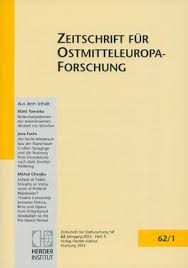„Bei uns werden die Menschen nicht nach ihren Verdiensten beurteilt ...“. Erster Weltkrieg und Staatsgründung in der Gedächtniskultur einer zentralpolnischen Provinz 1918-1939: Die Region Lublin als Beispiel
“Over here people are not judged according to their merits…“. World War and State Formation in the Cultural Commemoration of Poland (1918-1939)
Author(s): Christhardt HenschelSubject(s): Cultural history, Political history, Pre-WW I & WW I (1900 -1919), Interwar Period (1920 - 1939)
Published by: Verlag Herder-Institut
Keywords: “Over here people are not judged according to their merits…“; World War; State Formation; Cultural Commemoration of Poland (1918-1939);
Summary/Abstract: The formation of the state what we refer to as Second Polish Republic in November 1918 was inseparably linked with the events of World War I, which resulted into the collapse of Poland’s three occupying powers. As much as political everyday business was affected by a deep rift which ran through the political camps, as deeply the country was divided with regard to its cultural commemoration. The main conflict was carried out around the question whether it was the armed deployment of various military formations at several battlefronts of the World War or the persistent diplomatic efforts of Polish politicians with the Allied Western Powers which in the end played the decisive role for Poland to regain its independence. In Poland the means to keep World War I in memory resembled to a large extent the common practice of other European states, such as the death cult or the combatants’ cultivation of their traditions. However, some of its variants were only comprehensible in the context of Poland, which was highly affected by the culture of remembrance of the 19th century as well as the internal animosities of the first decades of the 20th century. Striking examples of these conflicts are the honour of individual characters of the military or the choice of the date for Poland’s national holiday. In the long run the political camp around the Polish marshal Piłudski, which took advantage from its military takeover in May 1926, in openly exerting influence on the Second Republic’s official cult of remembrance succeeded to enshrine its historical narrative into the cultural commemoration of Poland.
Journal: Zeitschrift für Ostmitteleuropa-Forschung
- Issue Year: 59/2010
- Issue No: 1
- Page Range: 34-64
- Page Count: 31
- Language: German

